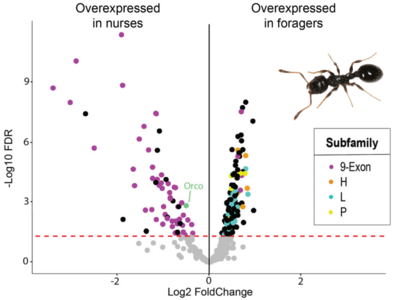Foitzik/Baumann/Gerber/Kokko
The role of epigenetic mechanisms in the regulation of division of labor in the ant Temnothorax longispinosus
Supervisor: Susanne Foitzik
Co-Supervisor: Peter Baumann, Susanne Gerber, Hanna Kokko
Scientific Background
Division of labor is a key organizing principle of complex biological systems. Similar to how cell specialization in multicellular organisms develops through differential gene expression, individuals in insect societies specialize in specific tasks, mostly through phenotypic plasticity. Worker specialization on tasks such as brood care, foraging or defense usually changes with age and depends on colony needs. Theory posits that flexible response thresholds to task-related cues regulate worker specialization. Besides, task-specific genes and epigenetic regulators of division of labor such as histone acetylation and transcription factors have been identified. Despite these advances, we lack a comprehensive understanding of how exactly external and internal signals alter gene networks and how these control task-specific behavior.
We focus on the ant Temnothorax longispinosus to investigate division of labor, expression and functions of task-specific genes and the importance of epigenetic regulators. We demonstrated that transcriptional activity is more strongly linked to task than to age (Kohlmeier et al. 2019), and identified a candidate gene, vitellogenin-like A, which we functionally annotated using RNAi. The expression of this gene regulates nursing behavior and controls the response of workers to task-related chemical cues (Kohlmeier et al. 2018). The differential expression of eight times as many genes in the antennae - the organ of odorant perception - than in the brain between nurses and foragers showed the importance of the peripheral nervous system for task-specific behavior (Caminer et al. 2023). Half of all odorant receptors were differentially expressed, leading us to hypothesize that the antenna might act as a sensory filter that causes workers to focus on tasks whose cues they can perceive well. We also showed that worker behavior in T. longispinosus is regulated by H3K27 histone acetylation (Libbrecht et al. 2020, Kohlmeier et al. 2023) and is related to the expression of regulatory microRNAs.
Project description
The aim of this exciting PhD project is to resolve the molecular regulation of division of labor between workers in ant societies. We want to identify which epigenetic processes are involved, and how (and over which timescales) these processes alter gene networks. We will investigate how external and internal signals change - or interfere with - gene-regulatory-network dynamics and how a modified network changes the input (i.e. odorant perception) and output (i.e. behaviour) responses. Moreover, we will investigate whether differential expression of odorant receptors - rather than “internal” epigenetic information processing - regulates worker specialization to specific tasks and how a proposed sensory filter can be dynamically regulated. In particular, we will manipulate regulation in two fundamentally different ways: with chemical inhibitors as well as manipulations of colony demography, the latter mimicking different ecological conditions. This is followed-up by RNAseq, microRNA, CUT&TAC analyses, and possibly single cell Seq of focal tissues. We will study the speed and reversibility of regulatory processes and transcriptional activity in the antennae and brain by comparing foragers that switched back to brood care to foragers and brood carers that remained specialized. Moreover, we will use RNAi-mediated downregulation of candidate genes to investigate how they control downstream regulatory networks and interfere with transcriptional activity in other tissues. In collaboration with Evolutionary Theoretician Hanna Kokko and her team we will model not only the gene regulatory networks underlying worker specialization, but also use evolutionary simulations to investigate how a dynamics sensory filter instead or in addition to response thresholds can regulate division of labor in ant societies.
What you will learn
You will learn a range of cutting-edge epigenetic molecular techniques such as CUT&TAC, RNAseq, microRNA and RNAi. In addition, you will be introduced to bioinformatic analysis and mathematical modelling and will become over time experienced with the development and customization of bioinformatic scripts and evolutionary simulations. Furthermore, you will gain an advanced understanding of evolutionary processes, especially of behavioral genomics. Finally, you will learn how to collect and maintain ant colonies and study their behavior.
Your qualifications
Master's degree or 4-year Bachelor's degree in biology, molecular biology or bioinformatics. Of course, good knowledge of bioinformatics, molecular genetics, and behavioral and evolutionary biology is needed, but if you do not yet meet all of these criteria but are interested, please apply. Knowledge of mathematical modelling and the biology of social insects, especially ants is a plus, but can also be acquired during the PhD.
Publications relevant to this project
Caminer, M.A., Libbrecht, R., Majoe, M., Ho, D. V., Baumann, P., Foitzik, S. (2023) Task-specific odorant receptor expression in worker antennae indicates that sensory filters regulate division of labor in ants. Communications Biology, 6, 1004 https://doi.org/10.1038/s42003-023-05273-4
Kohlmeier, P., Feldmeyer, B. Foitzik, S. (2023) Histone acetyltransferases and external demands influence task switching in Temnothorax ants. Biology Letters, 192023017620230176; http://doi.org/10.1098/rsbl.2023.0176
Libbrecht, R., Nadrau D., Foitzik, S. (2020) A role of histone acetylation in the regulation of circadian rhythm in ants. IScience, 23: 100846, DOI: 10.1016/j.isci.2020.100846
Kohlmeier, P., Alleman, A., Libbrecht, R., Foitzik S.* Feldmeyer, B.*, (2019) Gene expression is more strongly associated with behavioural specialization than with age or fertility in ant workers. Molecular Ecology, 28: 658-670, https://doi.org/10.1111/mec.14971
Kohlmeier, P., Feldmeyer, B., Foitzik S. (2018) Vitellogenin-like A - associated shifts in social cue responsiveness regulate behavioral task specialization in an ant. Plos Biology, 16(6): e2005747, DOI: 10.1371/journal.pbio.2005747
